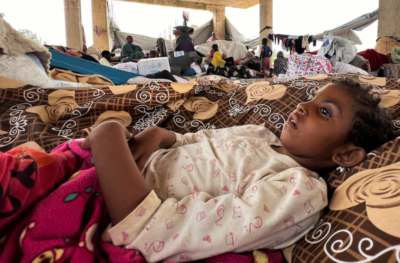Sudan has been hit by a deadly cholera outbreak that has infected hundreds of people in recent weeks, health authorities said. As of the start of this week, nearly two dozen people had died from the disease.
The country has been ravaged by a 16-month conflict and devastating floods.
The outbreak is threatening refugees and displaced communities.
The UN Refugee Agency (UNHCR) reported that the spread of the disease is of particular concern in states hosting refugees – mainly Kassala, Gedaref, and Jazirah states.
Five refugees have died from the disease, the UNCHR said.
Eritrean refugee Amena Adam Ali is recovering after contracting cholera.
She was treated at a clinic in one of the refugee camps in Kassala.
Her small daughter, who has also developed cholera symptoms, lies next to her.
Cholera is a fast-developing, highly contagious infection that causes diarrhea, leading to severe dehydration and possible death within hours when not treated, according to the WHO.
It is transmitted through the ingestion of contaminated food or water.
The cholera outbreak is the latest calamity for Sudan, which was plunged into chaos in April last year when simmering tensions between the military and a powerful paramilitary group exploded into open warfare across the country.
The conflict has turned the capital, Khartoum and other urban areas into battlefields, wrecking civilian infrastructure and an already battered health care system. Without the basics, many hospitals and medical facilities have closed their doors.
It has killed thousands of people and pushed many into starvation, with famine already confirmed in a sprawling camp for displaced people in the wrecked northern region of Darfur.
Sudan’s conflict has created the world’s largest displacement crisis. More than 10.7 million people have been forced to flee their homes since fighting began, according to the International Organization for Migration. Over two million of those fled to neighboring countries.
The fighting has been marked by atrocities including mass rape and ethnically motivated killings that amount to war crimes and crimes against humanity, according to the U.N. and international rights groups.
